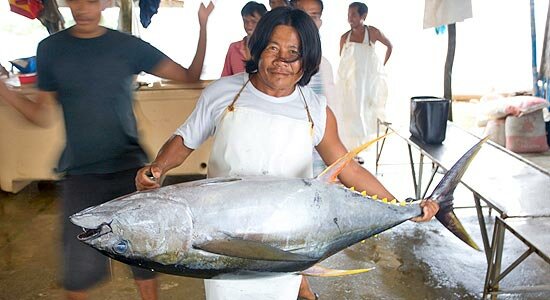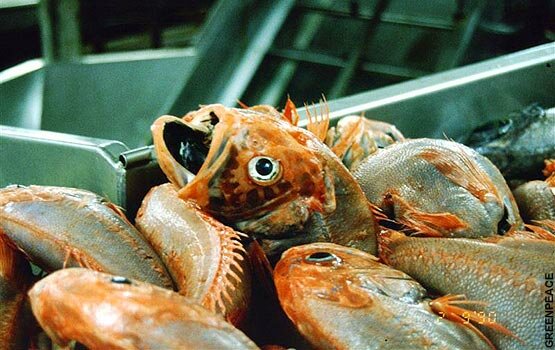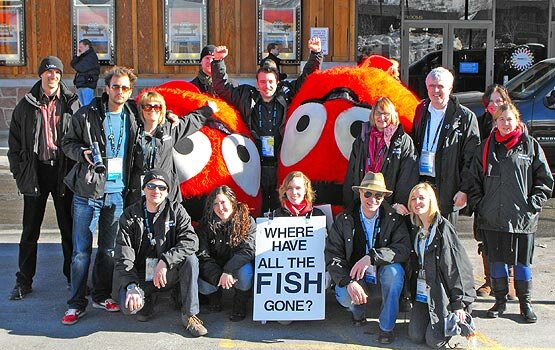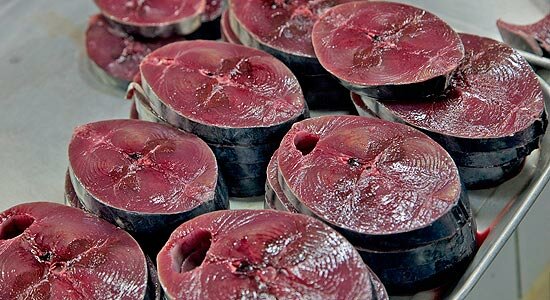Tag Archive for 'science'
It was an ambush. Fishing nations, led by Libya, ruthlessly voted down proposals to ban international trade in Atlantic bluefin tuna at the meeting of 115 parties to the Convention on International Trade on Endangered Species this afternoon.
Delegates from Monaco, the EU and the United States had hoped to keep the proposals being discussed into next week in the hope that compromises could be found. In the event, the debate was short and not at all sweet. Monaco’s proposal for an unqualified trade ban was rejected by 68 votes to 20, with 30 abstentions. Before that, the EU’s highly qualified version of the same proposal was crushed by 72 votes to 43.
The debate began with Monaco’s ambassador, Patrick Van Klaveren, speaking out in favour the proposal to place the Atlantic bluefin on Cites Appendix 1, on the grounds that the tuna had declined to less than 15 per cent of its original stock and UN scientists from two official bodies accepted that the criteria for it to be listed on Appendix 1 had been met.
This was followed by a lacklustre presentation, by the Spanish presidency, in favour of the conditions the EU wanted to place on the proposal. Then, instead of the torrent of support conservationists had hoped for there was a cascade of fishing nations, starting with Canada, speaking out against the proposed ban and in favour of leaving the management of the bluefin with the Atlantic tuna commission, ICCAT, which until recently has failed to set scientifically based quotas or to crack down on illegal fishing.
Speeches in favour of ICCAT continuing to manage the species, which can fetch up to $100,000 for a single specimen on the Japanese market, rolled on – Indonesia, Tunisia, United Arab Emirates, Venezuela, Chile, Japan, Grenada, Korea, Senegal, Morocco.
Tunisia talked of social problems that would be caused if there was a ban, Morocco spoke of 2000 families in an area of no other employment who would have no income. Morocco said the bluefin was a flagship species it was in the interests of all to preserve, but said it was premature to regulate it under Cites.
Only Kenya, Norway and the United States spoke up in favour of a ban, despite advice from both the UN Food and Agriculture Organisation and ICCAT’s own scientific committee that the bluefin deserved a respite from international trade.
By the time the eccentric Libyan delegate got the floor, it was clear where the majority lay. All it took was for Libya to propose a vote on Monaco’s proposal, and the chairman of the meeting, John Donaldson, had to put the proposal to close the debate to the meeting.
It was quite clear from there what would happen. Once the vote to hold a vote had been passed, the votes on the EU’s and Monaco’s vote were both lost.
Patrick Van Klaveren, for Monaco, said magnanimously: “It is not a defeat it is the manifestation of confidence put in ICCAT to solve the problem.” He threatened to come back in 2013 with another proposal to list the bluefin under Appendix 1 if ICCAT failed to take up the challenge to manage the bluefin for recovery.
At the press conference he shook hands with the leader of the Japanese delegation, Mitsunori Miyahara, who had taken part in the defeat of an attempt to place the bluefin on Cites in 1992.
Mr Miyahara, chief counsellor to the Japanese Fisheries Agency, said: “We agree that the bluefin is not in good shape. We have to take any measure for recovery. We have to work harder from now on.”
He said that at last November’s meeting of ICCAT, “finally the system started to work.”
“We are going to wipe out illegal fish from our markets.”
Sue Lieberman of the Pew Environment Trust branded the decision “irresponsible.”
“This meeting has said let’s take science and throw it out the door. There was clearly pressure from fishing industry. This fish is too valuable for its own good.
“Statements made about ICCAT blatantly were false. It’s time to hold ICCAT’s feet to the fire. We will be there every step of the way.”
Charles Clover

So, here in Brazil, the game is on. At the end of yesterday’s session the parties around the table at the ICCAT meeting were asked what their priorities were for conserving bluefin tuna.
One by one they made positive murmurings about wanting to ‘follow the scientific recommendations’, and enforce compliance with them. They all pretty much said they want to see illegal fishing tackled.
No rocket science there, and you would be forgiven for wondering why they have not done those things already!
More importantly there were also some hints as to how low some countries would go in terms of a quota, with several actually suggesting the possibility of closing the fishery. To you and me that may be a no-brainer. To many of them, it is a seismic shift.
Now, we shouldn’t get ahead of ourselves here. There is a lot of horse-trading to be done behind closed stable doors. And it’s worth noting that the talk about closing the fishery is just for one year – which could well be a very convenient way of avoiding bluefin being subject to an international trade ban under CITES.
Greenpeace, and other conservation organisations here, won’t settle for that – and we are reminding the participants at ICCAT that the only credible thing they can do is close this fishery.
And it seems they desperately want to regain some credibility here. You can understand that, after all ICCAT was branded an ‘international disgrace’ by an independent review.
The spotlight is on them because of what they have allowed to happen to bluefin, and the bureaucrats who attend these meetings really don’t like that. Delegate after delegate has talked about the need for ICCAT to claw back credibility, conveniently ignoring that this is a situation their own bad judgement in the past has got them into.
From an observer’s point of view here there is much to be cynical about. This is a dysfunctional meeting in a tropical paradise, at a resort whose very construction has caused disruption and problems for the local coastline in Brazil, with gala dinners, cocktail receptions, and a self-congratulating bunch of faceless bureaucrats mismanaging species, fisheries, and livelihoods.
Yesterday was an eye opener, with some impassioned and stirring interventions (particularly from some of the African delegations) requesting stronger action to protect stocks of fish in their waters.
At several points I wanted to stand up, cheer and applaud. But those heartfelt pleas were met by some cynical process point-scoring by delegations on the other side of the table, immediately filling me with despair.
There is still a long way to go here.
- Willie MacKenzie is part of Greenpeace’s Ocean Campaign. This blog post originally appeared on the Greenpeace UK website.

Scientists say the population of Atlantic bluefin tuna has crashed so low that an immediate ban on international trade in the species is justified.
Scientists from the International Commission for the Conservation of Atlantic Tunas (ICCAT) said that spawning stocks of bluefin have fallen below 15 per cent of what they were historically on both sides of the Atlantic.
Their analysis said that that a suspension of commercial fishing was the only measure which would take the bluefin – which has become the symbol for many of European and Atlantic nations’ failure to manage their fisheries - out of the category of qualifying for a trade ban within a decade.
The scientists met in Madrid, Spain from Oct 21-23 to assess current stock status of Atlantic bluefin tuna against the specific criteria necessary to list a species under Appendix I of the Convention on International Trade in Endangered Species (CITES) – which would trigger a trade ban.
Earlier this month, the Principality of Monaco submitted a CITES Appendix I listing proposal to temporarily ban international commercial trade and allow the species to recover from years of ineffective fisheries management and control.
The official assessment of bluefin’s extreme stock decline was welcomed by the environment groups WWF, Greenpeace and the Pew Environment Group.
“What’s needed to save the stocks is a suspension of fishing activity and a suspension of international commercial trade – this is the only possible package that can give this fish a chance to recover,” said Dr Sergi Tudela, head of fisheries at WWF Mediterranean.
“We must stop mercilessly exploiting this fragile natural resource until stocks show clear signs of rebound and until sustainable management and control measures are firmly put in place.”
“The ICCAT scientists have made formal what we have been saying all along – that Atlantic bluefin tuna is balancing precariously on the edge of collapse, and only drastic measures can now ensure this endangered species gets a fighting chance of recovery,” added Sebastian Losada of Greenpeace International.
“The extent of the failure by ICCAT members to act responsibly and preserve our marine environment can no longer be ignored.”
The verdict of the scientists will be submitted to ICCAT nations who will decide whether they will support an immediate trade ban or whether they will grant a quota for next year at their meeting next month in Recife, Brazil.
“Independent of what ICCAT decides to do in November, the science is undeniable that Atlantic bluefin tuna meets the criteria for a suspension of trade through a CITES Appendix I listing – and if ICCAT stops the fishing too, so much the better for this species,” said Dr Susan Lieberman of The Pew Environment Group.
“Atlantic bluefin tuna has been subject to decades of massive overfishing and overexploitation and time is running out to save this species.”
WWF, Greenpeace and The Pew Environment Group are calling on ICCAT to impose a zero quota next month. Interest will focus on what ICCAT does with the advice of its own scientists; in the past, the advice of ICCAT’s scientists has been largely ignored.
The next conference of the 175 members of the CITES treaty, meanwhile, is in Doha, Qatar, in March 2010, when WWF, Greenpeace and the Pew Environment Group are calling on members to vote in favour of an Appendix I listing for the bluefin.

So. Is the glass half full, or half empty?
There are of course other options, and it may well be difficult to tell because you are looking at the glass from a funny angle.

The new report underlines that in large swathes of the worlds' fisheries conservation measures are not happening
That certainly seems to be the conclusion when reading the various media interpretations of an important new study published in the journal Science on the world’s fisheries.
The study’s key co-authors are Professor Boris Worm, and Professor Ray Hilborn – who can be seen verbally dueling over the state of the world’s fisheries in The End Of The Line.
Continue reading ‘Good news for fisheries - if we continue conservation measures’

News of The End of the Line is spreading far and wide.
Dutchmen Jos Wassink and Koos Termorshuizen are currently on a three-month cycling tour around the North Sea.
They stopped off in Dedham, Essex, to see Charles Clover on their way through England and wrote about it on their website Northseacycling. You can read their interview - Inconvenient Truth of fisheries - on the site.

The Science Museum turned out to be a very appropriate venue to host our special preview screening of The End of the Line on Monday night.
On a balmy summer evening well over 350 guests filled the spectacular IMAX cinema to see the film.

Donna Air, George Duffield, Producer of The End of the Line with Geri Halliwell, and Stephen Fry
After a reception surrounded by replicas of early planes, jet turbine engines and other flying machines a glittering array of people sat down.
Among the guests were Stephen Fry, Geri Halliwell, Donna Air and Sarah Brown, the Prime Minster’s wife. Continue reading ‘Stars turn out for The End of the Line screening at the Science Museum’

Scientists have published the first study that casts doubt on some of the health benefits of fish oils - and say that daily doses may actually increase the risk for people already suffering heart disease.
- Are dietary recommendations for the use of fish oils sustainable? - study from Canadian Medical Association Journal
- Charles Clover: Omega 3 from oily fish health benefits - the totem wobbles
-
Omega 3 fatty acids contained in oily fish such as salmon and tuna have long been hailed a “super food” which plays a key role in boosting our immune system, staving off heart attacks and cancer as well as increasing brain power.

Tuna are rich in Omega 3 fatty acids, but are also under threat from overfishing
But the latest study finds little evidence to support the more extravagant claims and experts discovered that angina sufferers may put themselves at higher risk by taking fish oils.
The authors say that people in developed countries already have access to plenty of Omega 3 fatty acids in their diet, while people in poor countries were being deprived of essential oils and proteins by foreign fishing fleets. Continue reading ‘Omega 3 in oily fish may increase heart disease risk, study finds’

Dramatic title perhaps, but maybe not quite so far-fetched.
In Sundance, one of the questions that came up repeatedly at showings of the End Of The Line movie is ‘what about climate change?’ assuming, rightly, that a warming planet will have implications for our fish populations too.

Orange roughy after being caught by a deep sea trawler
Well my practised response to this before I got there was simply that the effects of climate change make all of the issues of rapacious overfishing all the more important. They make the need for precaution when it comes to fishing, and the need for fully protected areas essential.
The truth is that climate change is already affecting our oceans, and we don’t know what the outcome will be on currents/temperature/salinity, which means we can’t predict what impact it will have on plankton or anything more complicated.
But common sense tells us, in degraded oceans, where we have already diminished sealife’s ability to cope, it won’t be good news. Continue reading ‘Save the fish and save the world!’

There have been moments during the production of The End of the Line when we have felt that someone up there wanted this film to be made and to be seen by as many people as possible.
It happened again as we arrived in Park City, Utah, for the Sundance Film Festival.

The End of the Line team after the world premiere
Jeff Hutchings, a professor from Dalhousie University, Canada, travelled here at his own expense just to be part of the excitement and see himself in the film.
On arrival he handed us a cutting of a story from Science: the first proof of a link between global overfishing and climate change.
Continue reading ‘World premiere of The End of the Line’

When the history of the last half century is written, will we think that governments, scientists and environmental leaders identified the right global problems and got to grips with them, as the human population doubled, and looked like doing so again?

Fish steaks - Rampant, uncontrolled fishing is already pushing whole species, such as the magnificent bluefin tuna towards extinction
Or will we think that huge problems emerged on our watch while reason slept?
The inconvenient truth about the sea, which covers 70 per cent of the Earth, is that arguably the worst impact upon it so far – if you study the latest scientific assessments - has been caused by the mundane pursuit of human food and not by global warming or acidification, major threats though these are to our common future. Continue reading ‘The inconvenient truth about the sea’

![]()







